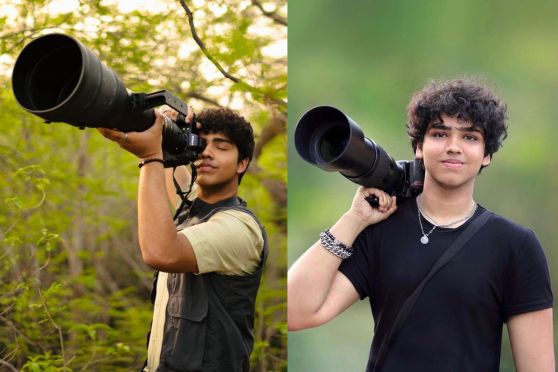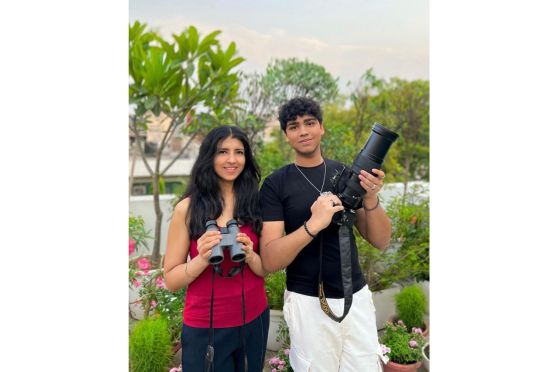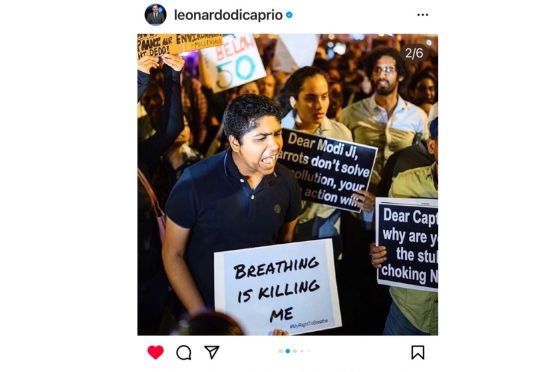World Environment Day | Meet Aman Sharma, the 20-year-old fighting against climate change


Aman Sharma in his quest to bring a change in the world, started a petition to the Indian government in May 2019, demanding they declare a climate emergency for the country. He was able to gather a whopping 350,000 signatures. His petition eventually saw a ripple effect as it became so popular that other activists reached out to start similar campaigns in their own countries.
After unifying his movement with Change.org and 74 other petitions, he was able to gain around 1.2 million signatures calling for a climate emergency declaration in 70 different countries. His petition contributed to real change: the European Union, Austria, UK, the state of New York, and others have all declared climate emergencies after his movement petitioned to them.
His dedication and work have garnered support from the likes of several celebrities and environmentalists such as Leonardo Di Caprio, Greta Thunberg and more.
We, at The Telegraph Online Edugraph, caught up with the 20-year-old, who is currently pursuing a degree in Environmental Studies at the University of Pennsylvania, USA. Excerpts from the interview:
Q. How did your love for nature arise?
My parents used to take us to national parks and forests as kids for our family holidays, which instilled a love for nature in me. I was fascinated with the fact that we shared out land and coexisted with thousands of species simultaneously. I started waking up at 6 am before school just to spend some extra time with the birds on my terrace. In one sitting I almost spotted 25 species of birds, and when I asked my school teacher and family, they had no idea there were so many species in the city itself!
Realising this huge gap between our lives and nature, I started taking out school kids for an educational period to urban wildlife spaces, and national parks by co-founding the Cuckoo Club. I wanted to spread the idea that bird watching can be done by young children as well.

Q. Tell me about when your passion for bird photography took on a new meaning
I used to skip parties and weekend outings with friends to spend time in the hills of Uttarakhand or in the deserts of Rajasthan. Trying my best to document the birds so that I could bring attention to India’s wildlife and national heritage. That is when this turned into a passion more than a hobby.
I started posting pictures of the birds on my Instagram account (birds_of_india_) which has now over 200k followers and has been a great way of connecting with people in urban areas and educating people.
Q. Why did you get into a degree in Environmental Studies?
I always knew that I will be pursuing something that I am passionate about and that would genuinely make me happy. Being able to [find a field where] my profession and passion intersect, and the thought of being able to do something for the environment is like a paid vacation for me.
As soon as I got into wildlife photography, which was my calling, I received immense support from my parents. I got into environmental studies after doing summer school at Ashoka University, where I came across a professors who told me what environment studies was.
It was a great opportunity to pursue my studies at an Ivy-league school and I am looking to work in the climate and conservation space after graduating.
Q. Share some of your biggest achievements in this movement.
I got to speak at the Nature for Life hub at the 75th UN General Assembly and the Nobel Peace Prize Center’s Oslo Pax, which was a great moment of pride representing my country. Additionally, my work has been recognised and shared by Leonardo Di Caprio, Shawn Mendes, Dia Mirza and Bhumi Pednekar. I’m also Nikon India’s youngest-ever ambassador for my contribution to conservation photography.

Q. You have been on ground, directly influenced people, campaigned and participated in international events for climate change. Speaking from your experience, what do you think we are missing and how can young minds contribute to solve this problem?
In our school curriculum, we are not taught beyond education. We are not taught about the wildlife that exists beyond our backyards. How many people know that Delhi is the second-most bird-populous city in the world, with more than 500 species of birds. Almost 18 years of being in school and I was never taught this.
How do you fight a problem if you don't even know it exists? People in India don't realise that climate change is a thing. They have not been given the education that gives them the capacity to be able to connect the pollution in Delhi to the droughts in Chennai or to the sea level rise in Mumbai. This is climate change which is affecting all of us.
[There is also] a lot of noise about irrelevant issues, instead of focusing on the constant issues such as the heatwaves that have killed people and crops. These are issues that no one talks about, bees are disappearing from the cities, which are so vital for the environment. Birds too have disappeared in large numbers from Mumbai and Delhi.
A lot of birds when they eat fruit, they excrete the seed. That is how a lot of trees grow. When we see trees not growing anymore at that scale, it is because of the lack in the number of indigenous species of birds. This has led to the crumbling of the ecosystem leading to a reduction in the number of trees. Thus creating more warming and a decrease in the purification of air, causing pollution.
Industries are now finding ways to come into the cities, and bearing the brunt are the underprivileged people who cannot afford air purifiers. The ignorance, apathy and plight of the common man are not understood by the people since it is not represented widely by the media.
We need a structured policy plan. Climate change as a topic doesn't have many policies and laws in India. There has been a lot of talking, and greenwashing but not much action has been yet taken. We have scaled up our solar energy, onto becoming a world leader in renewable energy, but at the same time, India’s requirement for coal is only projected to grow and multiply in a large amount in the near future!
Through his talk Aman highlights for us what the ground realities are - and like himself, he inspires other youngsters to take charge. It doesn’t matter if you are in school or college - if you want to make a difference - you need to determine now.
We all are aware of how much the heatwaves this summer have tormented most of the country making it look like endless summer days and nights. With India being the most directly impacted by climate change, the government and the people should act soon. Stricter laws should be implemented, educational institutions should focus on better climate-inclusive courses and of course, change starts at home. So, this environmental day let’s take a pledge to make a difference.